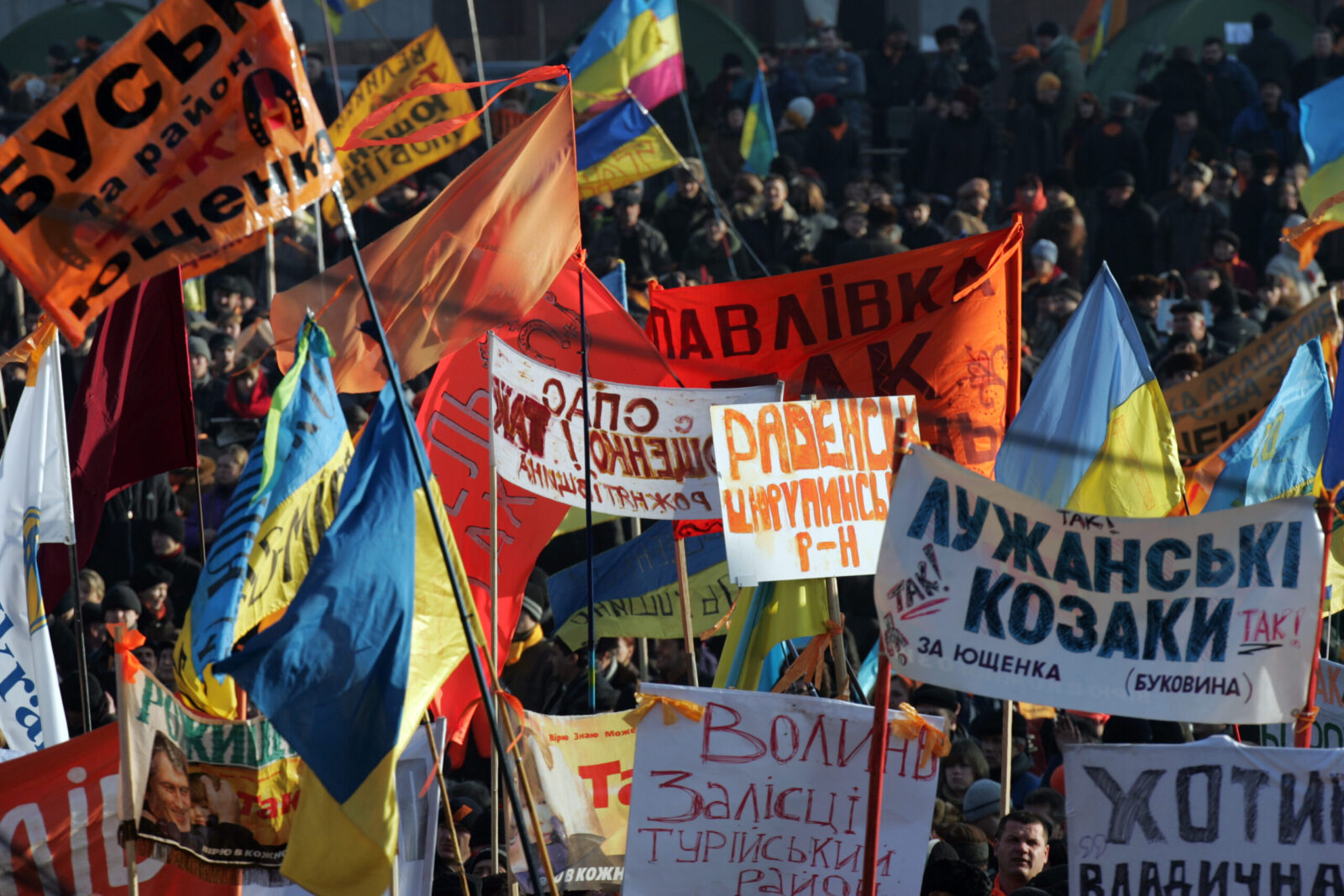What Ukraine can teach America
The response of Ukrainian society to Russia’s invasion stands out for its unity. Almost overnight, almost all sections of society agreed to work together to resist such aggression. This reality contrasts greatly with the divisions currently found in America, Kyiv’s most crucial ally.
February 9, 2024 -
Sam Patten
-
Articles and Commentary

Protestors gathered in the Ukrainian capital in December 2004 during the Orange Revolution. Photo: Alexandr Zadiraka / Shutterstock
“This all looks very familiar to me,” a Ukrainian politician told me as we brushed up against an angry mob while waiting to enter the Washington Convention Center for Donald Trump’s inaugural ball nearly seven years ago. Violent protestors were spitting and making threats while trying to push down the makeshift fence that separated them from us “penguins” and “princesses”, lining up to go through security for the controversial party.
A little girl dressed like the central figure from Disney’s “Frozen” in front of us burst into tears, and her parents – who were bringing her to what they thought would be a very special evening – tried in vain to comfort her.
For that moment at least, America looked a lot like Ukraine, as Serhiy Lyovochkin was saying. He resigned his position as former Ukrainian President Viktor Yanukovych’s chief-of-staff over the government’s violent response to the Maidan protests of early 2014. I took him at his word.
Much has changed in both countries since then. America has now had almost four years without Trump as president, and Russia has directly invaded Ukraine (even if its 2014 seizure of Crimea and support for the DNR and LNR insurgencies were dark forewarnings of its intent). Yet despite all this, that off-hand comment from early 2017 seems fitting in the present moment.
Recently, US President Joe Biden delivered a dire speech about democracy in America teetering on the brink. It was not the first time he has said “democracy is on the ballot” – this was his rallying cry during the 2022 mid-term elections. But the more recent version of this rhetoric represents an even more pointed critique of Trump, his likely opponent in this November’s election, who, three years ago, dithered about whether or not he should concede defeat.
Some Americans call Biden’s rhetoric over the top, especially when you consider alternatives like China, Russia and Iran (“C’mon, man!”). But others are concerned that ever since Trump’s presidency, the land of liberty has regressed a lot. All Americans, though, would be wise to look to Ukraine’s example when considering this question.
In the early 2000s, when Vladimir Putin was consolidating his power, I served as the International Republican Institute (IRI)’s Moscow-based country director for Russia. A democracy promotion group, IRI tries to help new democracies strengthen their practices and institutions. From Moscow, I watched Ukraine jealously. These were the days just before the Orange Revolution, and one could feel the vitality of what was happening in Ukraine already.
Meanwhile, others in Moscow watched Ukraine less with jealousy than with fear and concern. Could this democracy „contagion” spread northwards?
Today, Ukraine is a country under the siege of war. Just after the invasion, in March 2022, I visited Ukraine to help a friend’s efforts for internally displaced persons. Immediately, I was struck by how united the country stood in the face of an external threat. Grandfathers were manning checkpoints with simple shotguns, and supermarkets were no longer selling alcohol. Everyone seemed to be doing his or her part for the nation’s defence – and survival.
What makes Ukraine fundamentally different from its aggressor is the sense of pluralism that runs in its blood. Consider the ancient process by which Cossacks elected their hetmen, or the historic practice of peoples of different faiths, languages and ethnicities living – for the most part peacefully – side by side.
As its heroic response to an invasion by a larger and in many cases better-equipped enemy has shown, Ukrainians can put aside the differences in their backgrounds for the common good. After September 11th 2001, Americans too gave this impression, but the effect was, unfortunately, short-lived. Witness the animosity with which Americans today treat our neighbours with opposing viewpoints (many of us hope, as the ancient Persian adage forecasts, that “this too will pass”).
While it may make sense that for practical reasons the government of President Volodymyr Zelenskyy has delayed scheduled elections because of the war, continuing to make martial exceptions like this could hurt Ukraine’s post-war identity. New restrictions under consideration in the Verkhovna Rada to curtail media and religious freedoms give some of the country’s many friends a moment of pause. In order to defend itself and defeat Russia, Kyiv must be careful not to more closely resemble the aggressor.
America has an unfortunate history of backing less than democratic regimes, like Iran, Nicaragua, El Salvador, the Philippines, South Vietnam and many others, because, as former President Harry Truman said, “they may be sons of bitches, but they’re our sons of bitches.” After long and costly wars in Afghanistan and Iraq, the appetite for this kind of relative adventurism in America has all but disappeared. The one reason Washington must continue to support Kyiv is because Ukraine is a free country under attack from an enemy of freedom.
The line between the “good guys” and the “bad guys” is never as clear as many would like. While it fights for its survival, Ukraine can teach America a vital lesson about what democracy really means – as long as the wrong sacrifices are not made in the name of expediency.
Sam Patten is a writer based in the American state of Maine and a former democracy promoter and international political consultant who has advised a number of Ukrainian politicians. His recent memoir, Dangerous Company: The Misadventures of a “Foreign Agent”, is his first book.
Please support New Eastern Europe's crowdfunding campaign. Donate by clicking on the button below.

































